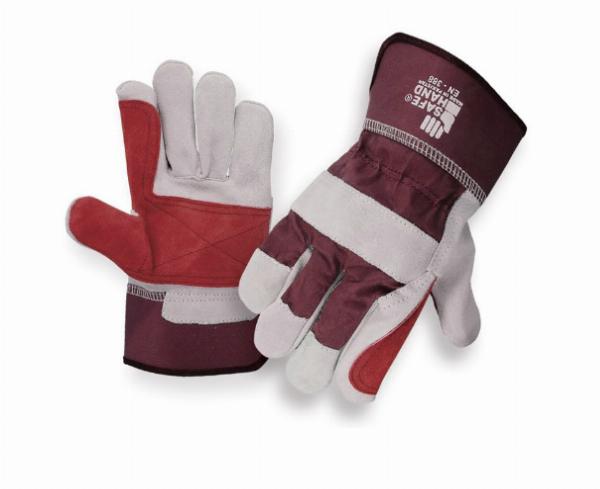The Ultimate Guide to Choosing the Best Work Gloves for Every Job

Strong8k brings an ultra-HD IPTV experience to your living room and your pocket.
Whether you're a construction worker, mechanic, farmer, or DIY enthusiast, the right pair of Safety gloves can make a world of difference in both your comfort and safety. With so many options available, it’s easy to feel overwhelmed when choosing gloves that fit your needs. In this guide, we'll walk you through everything you need to know to find the perfect gloves for your specific job. We'll cover key aspects like durability, grip, protection, and comfort, so by the end, you'll have a clear idea of what to look for.
Why Industrial Gloves Matter for Different Professions
Protective gloves aren't just an accessory; they're a critical piece of protective gear for anyone handling tools, equipment, or materials in demanding environments. Choosing the wrong gloves can lead to discomfort, reduced productivity, or even serious injuries.
Here’s a quick look at why the right gloves matter for different types of workers:
Construction workers deal with sharp materials and rough surfaces, so gloves need to offer strong protection and durability.
Mechanics and technicians require gloves with excellent dexterity for handling small parts and tools.
Farmers and gardeners need breathable, flexible gloves to protect against cuts and scratches from plants.
Industrial workers often handle chemicals, heavy equipment, or materials that require gloves offering specific protections.
DIY enthusiasts seek comfortable, basic gloves to handle a variety of home improvement tasks safely.
Factors to Consider When Choosing Work Gloves
Each job presents unique challenges, so it's important to find gloves that meet your specific needs. Here are some key factors to keep in mind when making your choice:
1. Material
Different materials offer different levels of protection and comfort. Some of the most common materials used in Construction gloves include:
Leather: Known for its durability and abrasion resistance, leather gloves are a great option for tough, heavy-duty jobs like construction or handling heavy tools. They are also popular among farmers and gardeners. Types of leather commonly used in gloves include cowhide, goatskin, and pigskin.
Rubber/Nitrile: These gloves provide excellent protection against chemicals, making them ideal for industrial workers who handle hazardous substances. Nitrile gloves are also puncture-resistant and offer good dexterity, perfect for mechanics.
Synthetic materials: Lightweight, breathable gloves made from synthetic materials like nylon or polyester are often used in general labor or for tasks that require flexibility and precision. They are particularly good for DIY enthusiasts or tasks where comfort and breathability are essential.
2. Grip and Dexterity
When your job requires precision, such as working with small tools or handling delicate materials, having gloves that allow you to maintain a firm grip without sacrificing mobility is crucial.
Construction workers may prefer gloves with textured or rubberized palms for a solid grip, even when handling slippery materials like wood or metal.
Mechanics need gloves that offer a snug fit and superior dexterity, often opting for thinner gloves that won’t get in the way when working with bolts or engine parts.
Farmers and gardeners benefit from gloves that have reinforced fingertips, providing better control when dealing with plants and equipment.
3. Protection Against Hazards
Safety should always come first. Depending on the type of work you do, different gloves offer protection against specific hazards:
Cut-resistant gloves: If you’re handling sharp tools or working around sharp edges, look for gloves that offer cut resistance. These gloves often have a special lining made from materials like Kevlar or steel mesh.
Chemical-resistant gloves: For workers who deal with hazardous liquids, such as industrial workers, chemical-resistant gloves made from materials like nitrile or latex are a must.
Heat-resistant gloves: Welders or those working in hot environments need gloves that can protect their hands from burns, often made from special heat-resistant leather or synthetic fabrics.
Waterproof gloves: For outdoor workers, such as farmers or construction workers dealing with wet conditions, waterproof gloves are essential to keep hands dry and comfortable during long work hours.
4. Comfort and Fit
It’s easy to overlook, but comfort can significantly impact your work performance. Gloves that don’t fit well can cause blisters or make your hands feel cramped. Look for gloves that fit snugly but still allow room for movement. Breathable fabrics or gloves with moisture-wicking liners are excellent for keeping your hands cool and dry, especially if you’re working long hours.
5. Durability
Consider how often you’ll be using the gloves. For heavy-duty tasks like construction or mechanics, you’ll want gloves that can withstand wear and tear without needing frequent replacements. Leather gloves are known for their long-lasting durability, while synthetic gloves might need more frequent replacements depending on the workload.
6. Weather-Specific Features
For those working outdoors, the weather can greatly affect the type of gloves you need. If you’re working in colder environments, consider insulated gloves or heated gloves to protect against frostbite. On the other hand, if you work in hot conditions, look for breathable gloves that wick away moisture and prevent your hands from sweating excessively.
7. Gender-Specific Gloves
While many gloves are unisex, some are designed specifically for men or women. Work gloves for women tend to offer smaller sizes and sometimes have additional padding in areas where women’s hands typically need more protection. Meanwhile, work gloves for men are often designed for larger hand sizes and may include heavier materials for rugged tasks.
Best Work Gloves for Different Industries
Let’s dive into the best types of gloves for each type of worker, based on their specific needs.
1. For Construction Workers
Recommended Gloves: Leather work gloves with reinforced palms, abrasion-resistant gloves, and cut-resistant gloves.
Why: Construction workers need gloves that protect against sharp objects, rough surfaces, and extreme conditions, all while offering a firm grip.
2. For Mechanics and Technicians
Recommended Gloves: Nitrile or synthetic gloves, cut-resistant gloves, and gloves with enhanced dexterity.
Why: Mechanics need gloves that allow them to work with precision while still offering protection from oil, grease, and sharp tools.
3. For Industrial Workers
Recommended Gloves: Chemical-resistant gloves, heat-resistant gloves, and cut-resistant gloves.
Why: Industrial workers often handle dangerous materials and tools. Gloves that protect against chemicals, extreme heat, or sharp edges are essential.
4. For Farmers and Gardeners
Recommended Gloves: Breathable cotton or synthetic gloves, waterproof gloves, and thorn-resistant gloves.
Why: Farmers and gardeners work with soil, plants, and equipment. Gloves that protect against cuts, thorns, and moisture while still being comfortable are ideal.
5. For DIY Enthusiasts
Recommended Gloves: General-purpose gloves, lightweight leather gloves, and synthetic gloves.
Why: DIYers need gloves that offer a mix of protection and comfort for occasional use. Flexibility and durability are key, especially when handling a variety of home projects.
How to Maintain Your Heavy-duty Gloves
Once you’ve invested in a good pair of Grip gloves, it’s important to take care of them so they last. Here are some quick tips:
Clean leather gloves with a damp cloth and mild soap, but avoid soaking them in water.
Synthetic gloves can often be machine washed, but always check the label for care instructions.
Inspect your gloves regularly for wear and tear, and replace them if they start showing signs of damage.
For leather gloves, use a leather conditioner to keep them supple and extend their lifespan.
Conclusion: Finding the Right Cut-resistant Gloves for You
Selecting the right Mechanic gloves is essential for ensuring both your safety and efficiency on the job. Whether you’re a professional working in hazardous conditions or a DIYer tackling weekend projects, understanding the different materials, features, and protective qualities of various gloves will help you make an informed choice. Remember, comfort and protection go hand in hand when it comes to gloves that work.
Ready to find your perfect pair of working gloves? Explore our range of high-quality gloves designed for every industry and task. Protect your hands and boost your performance today!
Note: IndiBlogHub features both user-submitted and editorial content. We do not verify third-party contributions. Read our Disclaimer and Privacy Policyfor details.


